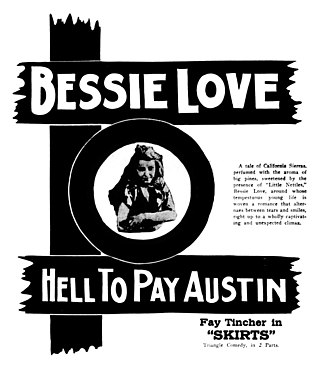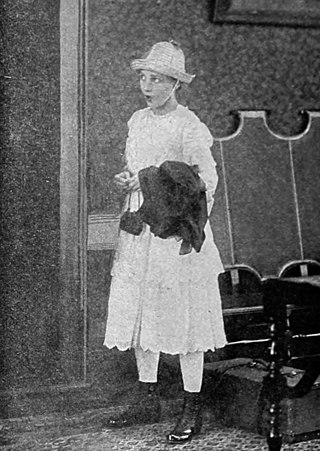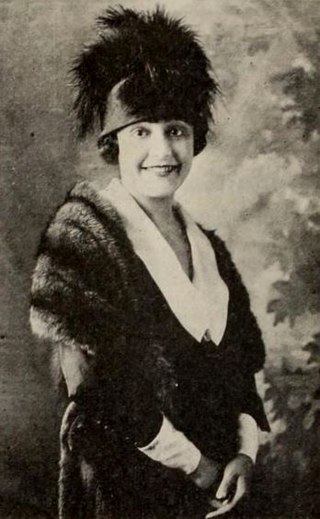
Lule Warrenton was an American actress, director, and producer during the silent film era. She appeared in more than 80 films between 1913 and 1922. She was born in Flint, Michigan and died in Laguna Beach, California and was the mother of cinematographer Gilbert Warrenton.

The Aryan is a 1916 American silent Western film starring William S. Hart, Gertrude Claire, Charles K. French, Louise Glaum, and Bessie Love.

Who's Your Neighbor? is a 1917 silent American propaganda and drama film directed by S. Rankin Drew. The film's plot focuses around reformers who pass a law to force prostitutes, including Hattie Fenshaw, out of the red light district. Fenshaw becomes Bryant Harding's mistress and lives in an apartment next door to a reformer, and continues to ply her trade. After Fenshaw becomes familiar with Harding, his son, daughter and the daughter's fiancé, the climax of the film occurs as the cast assembles at Fenshaw's apartment. Harding returns and a fight breaks out that results in the reformers' arrival and concludes with the presumption that Fenshaw returns to a place of "legalized vice". The drama was written by Willard Mack and was his first foray into screen dramas. The film proved controversial, but is noted as a great success. The film originally debuted on June 15, 1917, but it was rejected by the National Board of Review and was later approved after a revision, but the film continued to be labeled as an immoral production. The film is presumed to be lost.

Acquitted is a 1916 American silent mystery film produced by the Fine Arts Film Company and distributed by Triangle Film Corporation. Paul Powell directed a screenplay by Roy Somerville based on a 1907 short story by Mary Roberts Rinehart. Tod Browning served as an uncredited writer.

Cheerful Givers is a 1917 American silent comedy-drama film produced by the Fine Arts Film Company and distributed by Triangle Film Corporation. The film stars Bessie Love and Kenneth Harlan.

A Yankee Princess is a 1919 American silent comedy-drama film produced and distributed by the Vitagraph Company of America. It was directed by David Smith and stars Bessie Love, who also wrote the screenplay. It is a lost film.

A Daughter of the Poor is a 1917 American silent comedy-drama film produced by Fine Arts Film Company and released by Triangle Film Corporation. The film was directed by Edward Dillon and starred young Bessie Love.

Gentle Julia is a 1923 American silent romantic drama film based on the popular novel Gentle Julia by Booth Tarkington. Directed by Rowland V. Lee, the film starred Bessie Love. It was produced and distributed by Fox Film Corporation, and is considered a lost film.

Stranded is a 1916 American silent drama film produced by Fine Arts Film Company and distributed by Triangle Film Corporation. The film stars DeWolf Hopper with newcomer Bessie Love in a supporting role. The film is considered lost.

A Sister of Six is a 1916 American silent Western film produced by the Fine Arts Film Company and distributed by Triangle Film Corporation. The film was directed by brothers Chester M. and Sidney Franklin. This was Bessie Love's first starring role.

Hell-to-Pay Austin is a 1916 American silent comedy-drama film directed by Paul Powell and starring Wilfred Lucas in the title role, with Bessie Love, Eugene Pallette, and Mary Alden in supporting roles. Written by Mary H. O'Connor, the film was produced by D. W. Griffith's Fine Arts Film Company and distributed by Triangle Film Corporation. It is presumed lost.

Polly Ann is a lost 1917 American silent comedy-drama film produced and distributed by the Triangle Film Corporation. It was directed by Charles Miller and stars Bessie Love.

The Dawn of Understanding is a lost 1918 American silent Western comedy film produced by The Vitagraph Company of America and directed by David Smith. It stars Bessie Love in the first film of her nine-film contract with Vitagraph. It is based on the short story "The Judgement of Bolinas Plain" by 19th-century Western writer Bret Harte.

The Heiress at Coffee Dan's is a 1916 American silent comedy-drama film produced by the Fine Arts Film Company and distributed by Triangle Film Corporation. It starred Bessie Love and was directed by Edward Dillon.

Wee Lady Betty is a 1917 American silent drama film produced and distributed by the Triangle Film Corporation. It was directed by Charles Miller and stars Bessie Love, Frank Borzage, and Charles K. French. It is considered lost.

A Little Sister of Everybody, sometimes called A Little Sister to Everybody, is a 1918 American silent comedy-drama film directed by Robert Thornby and starring Bessie Love and George Fisher. It was produced by Anderson-Brunton Company and distributed by Pathé.

The Wishing Ring Man is a 1919 American silent drama film produced by Vitagraph Studios and directed by David Smith. It was based on the novel by Margaret Widdemer, and stars Bessie Love, with J. Frank Glendon in the title role.

The Little Boss is a 1919 American silent romantic comedy film directed by David Smith and produced by Vitagraph Studios. The story and screenplay were by Rida Johnson Young, and it starred Bessie Love and Wallace MacDonald.

Betty Howe was an American actress in silent films.

Edna Hunter was an American stage and film actress of the silent film era, who appeared in more than a dozen films between 1915 and 1918.





















